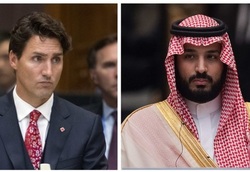 Rasa - With growing international condemnation and outcry against Saudi Arabia’s bloody war on Yemen, grisly murder of journalist Jamal Khashoggi, and increased tension between the Saudis and the West, Canadian Premier Justin Trudeau has confirmed for the first time that his government is openly looking for a way out of a $13 billion arms deal reached with the Saudis, but.
Rasa - With growing international condemnation and outcry against Saudi Arabia’s bloody war on Yemen, grisly murder of journalist Jamal Khashoggi, and increased tension between the Saudis and the West, Canadian Premier Justin Trudeau has confirmed for the first time that his government is openly looking for a way out of a $13 billion arms deal reached with the Saudis, but. As is often the case, the arms company in question, General Dynamics Land Systems-Canada, has issued a statement condemning the effort, and saying that there would be huge liabilities for terminating the contract, adding it would damage Canada’s defense sector in general to not sell arms to the Saudis.
The deal for Canadian arms transfers was reached by the Harper government in 2014. Trudeau’s government had previously endorsed it, though mounting anger over the murder of Jamal Khashoggi, as well as war crimes in Yemen, has Trudeau face growing calls from the United Nations and opponents to stake out a different position.
Mind you, Canada is not the only Western government that talks about human rights and international humanitarian law while at the same time fuelling the unnecessary bloodshed and humanitarian disaster in the poorest country in the Middle East. The United States, United Kingdom and several other Western governments are also under immense international pressure to end their complicity in Saudi war crimes in Yemen. Some have already ended arms transfers, but there are others like the US that is yet to do the same.
Just like Canada, these Western governments have been fueling the Yemeni humanitarian crisis through lucrative weapon sales to Riyadh used in the three year plus bombing campaign. Amnesty International says “countries such as the US, UK and France, which continue to supply coalition members with arms, are allowing Saudi Arabia and its allies to flagrantly flout international law and risk being complicit in grave violations, including war crimes.”
Amnesty further urges these countries to: "immediately halt the flow of arms and military assistance to members of the Saudi-led coalition for use in Yemen. This includes any equipment or logistical support being used to maintain this blockade."
Canada has licensed billions of dollars worth of arms sales to the Saudi regime, a relationship described as ‘shameful’ by Campaign Against Arms Trade, given Riyadh’s record as "one of the world's most authoritarian regimes." Other Western governments, too, have sold weaponry worth billions of dollars to Saudi Arabia. And the United States "designed and negotiated a package totaling approximately $110 billion" with Riyadh in 2017 following on from a total of $115 billion approved in arms sales by the Obama administration in 2009.
Tragically, all these guns and bombs are being used in the Yemeni conflict, where the deliberate, indiscriminate and criminal targeting of civilians and civilian structures such as hospitals and schools marks an all-time low in respect for the most basic humanitarian norms and laws. It’s a Western assault on human rights.
Yemen is a prime example of this deterioration in the climate for human rights. Even in the context of new ‘lows’ in the application of international laws and norms, the scale of the Yemeni crisis should cause international alarm and provoke immediate action by the West to end their arms transfers and complicity, and to end hostilities, particularly the Saudi airstrikes and blockade.
As is often the case, Canada certainly talks the talk when it comes to the Arms Trade Treaty. Its diplomats at the United Nations contend that “Canada is in favor of respecting international law and human rights law,” but then refuse to stop weaponizing the Yemeni humanitarian disaster. Canada is not walking the walk. It has yet to end its arms transfers, and the prospects of the country doing it any time soon are dim. Until it does, Canadian-manufactured rockets, bombs and munitions will continue wreaking havoc in Yemen.
Under the UN arms trade treaty, Canada has an obligation to halt the supply of weapons as they are being used for serious violations of international human rights and humanitarian law in the besieged port city of Hodeida – despite the ongoing UN-brokered ceasefire agreement. Canada, as a signatory, has pledged not to undermine the treaty’s object and purpose, which includes “reducing human suffering” – a commitment mocked by the current flow of Canadian arms in Yemen.
Soon Yemen will enter another grueling year of hunger, disease and war, with more than 20 million of its people now in need of humanitarian aid. Here, the moral and legal bankruptcy of the Canadian government’s support for the Saudi-led aggression has never been clearer.
847/940